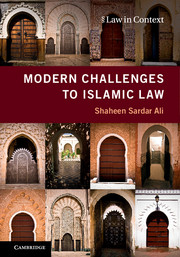Book contents
- Frontmatter
- Dedication
- Contents
- Acknowledgements
- Glossary
- Table of Cases
- Table of Legislation
- Introduction
- 1 Sharia: The Flowing Stream
- 2 An Elephant in the Room or a Needle in a Haystack? Searching for ‘Islamic’ Constitutionalism(s)
- 3 Contextualizing Family Law Reform and Plural Legalities in Post-colonial Pakistan
- 4 In Search of Legitimacy: The Dilemma of Islamic Finance
- 5 Muslim Women's Contributions to Drafting CEDAW: An Untold Narrative
- 6 CEDAW? What's That? ‘Domesticating’ ‘International’ Women's Human Rights in Muslim Jurisdictions: Reflections on Pakistan's Engagement with CEDAW
- 7 ‘Between the Devil and the Deep Blue Sea’: Sharia Councils and Muslim Women's Rights in the British Muslim Diaspora
- 8 Internet Fatawa: Challenging Tradition and Modernity in Women and Gender Issues
- Conclusion
- Bibliography
- Index
8 - Internet Fatawa: Challenging Tradition and Modernity in Women and Gender Issues
Published online by Cambridge University Press: 05 September 2016
- Frontmatter
- Dedication
- Contents
- Acknowledgements
- Glossary
- Table of Cases
- Table of Legislation
- Introduction
- 1 Sharia: The Flowing Stream
- 2 An Elephant in the Room or a Needle in a Haystack? Searching for ‘Islamic’ Constitutionalism(s)
- 3 Contextualizing Family Law Reform and Plural Legalities in Post-colonial Pakistan
- 4 In Search of Legitimacy: The Dilemma of Islamic Finance
- 5 Muslim Women's Contributions to Drafting CEDAW: An Untold Narrative
- 6 CEDAW? What's That? ‘Domesticating’ ‘International’ Women's Human Rights in Muslim Jurisdictions: Reflections on Pakistan's Engagement with CEDAW
- 7 ‘Between the Devil and the Deep Blue Sea’: Sharia Councils and Muslim Women's Rights in the British Muslim Diaspora
- 8 Internet Fatawa: Challenging Tradition and Modernity in Women and Gender Issues
- Conclusion
- Bibliography
- Index
Summary
Introduction
One of the main arguments advanced in this book is the inherent dynamism of the Islamic legal traditions and their responsiveness to social realities through various juristic techniques, mechanisms and institutions. Historically, one such mechanism has been the fatwa (plural fatawa) through which an individual, a qadi (judge) or a ruler sought a non-binding response to a specific legal issue. Over time these opinions grew into an imposing body of materials, some of which was incorporated into legal textbooks and manuals for future reference. As a flexible vehicle of legal interpretation, fatawa are a reflection of evolving norms of Islamic law and society in language comprehensible to lay members of Muslim communities.
Today, in an age of print and electronic media, the institution of ifta (the act of issuing fatawa) has undergone significant transformation whilst retaining its core function. Beyond the mediums of newspaper, radio and television, fatawa in their latest manifestation are being issued by ‘Internet muftis’ to a growing, Internet-savvy population of fatwa-seekers. Discourse on Internet fatawa as an interpretative and pedagogical tool, as well as an emerging discursive space in a virtual environment, is an ever-expanding field of investigation.
The present chapter looks at the idea that, in employing a combination of traditional ifta tools as well as the virtual environment of the World Wide Web, Internet fatawa simultaneously challenge tradition and modernity. Tradition is being challenged by a fragmentation of authority and a democratizing of knowledge, making it more accessible to individuals and communities at the national, transnational and international levels; while modernity is being challenged in the way Internet fatawa are legitimating and reviving historical formulations of legal interpretations.
Drawing upon a selection of fatawa on women, gender and family law norms from selected Internet sites, this chapter makes a number of observations. Most basically, the arrival of Internet fatawa has led to a dislocation of traditional forms of authority within the Islamic legal traditions. Internet fatawa exist within a virtual space, available within the privacy of the home, that makes women in particular more confident in raising questions which they would not pose face-to-face.
- Type
- Chapter
- Information
- Modern Challenges to Islamic Law , pp. 233 - 261Publisher: Cambridge University PressPrint publication year: 2016



